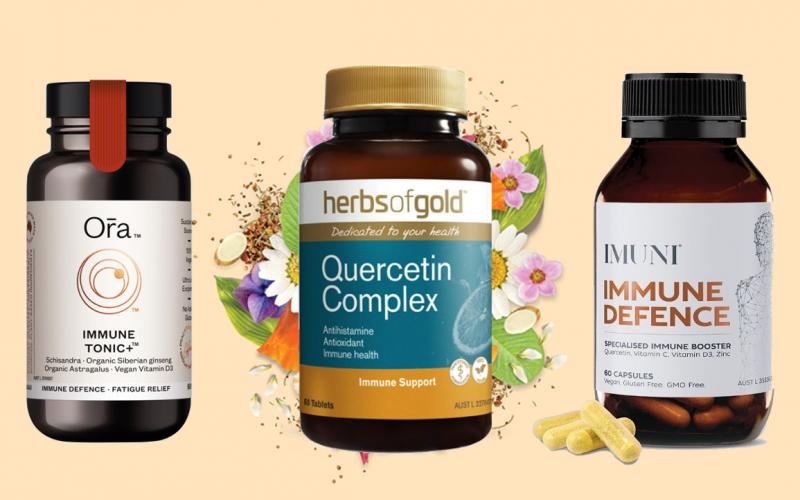What are the benefits of Quercetin?

High in antioxidants, anti-inflammatory and antihistamine actions, Quercetin can be a more holistic option when it comes to boosting immunity, fighting off allergies and protecting your heart.
Benefits of Quercetin:
-
Rich in antioxidant activity
-
Allergy fighting actions
- Anti-inflammatory activity
What is Quercetin?
Quercetin, a potent bioflavonoid, is part of a power-house group of compounds known as phytochemicals. Phytochemicals are non-essential nutrients for human growth but nevertheless, present a myriad of physiological benefits
Quercetin is predominantly located in the pulp and rind of citrus fruits. It also gives plants their white and yellow pigmentation and can be found in foods such as onions, apples, red wine and even green tea and buckwheat. It is also present in herbal botanicals such as Ginkgo biloba and Hypericum perforatum. Yet, whilst they can be derived from abundance of dietary sources, quercetin and other phytochemicals tend to be poorly absorbed and easily excreted. Thus, supplementation poses a great advantage.
Is quercetin good for the immune system?
Rich in antioxidant activity, these compounds help boost healthy immune function by combatting free radical damage caused by oxidative stress. If there are too many free radicals in the system, cellular damage and DNA degradation can occur. Quercetin ultimately helps to boost mitochondrial function[1], lessening the internal and external harm caused by environmental stressors and ageing.
As-well as being jam packed with antioxidant properties, quercetin has an immense range of other innate benefits ranging from anti-inflammatory activity to, cardioprotective and allergy fighting actions. Allergies in particular, can cause all types of unpleasant symptoms, causing mast cells in the body to release histamine, leading to watery, itchy eyes, a runny nose and hives. This has people reaching for over the counter pharmaceuticals and steroidal nose-sprays for instantaneous relief.
However, research over the last few years has shown that Quercetin has the ability to work as a natural antihistamine[2], without the side effects of drowsiness and fatigue. Additionally, when it comes to cardiovascular health, quercetin has been shown to improve circulation, lower LDL levels, strengthen walls of the blood vessels, and work as an antithrombogenic[3]. Indeed, its inflammatory effects have also been useful when it comes to repairing intestinal ulcers, and internal swelling and pain caused by lesions[4].
When looking for a Quercetin supplement, you can supercharge your preference by ensuring it is paired with either Vitamin C or Bromelain, an anti-inflammatory enzyme found in pineapple. The synergistic effect of these compounds enhances absorption and boosts anti-inflammatory activity. Recommended dosing ranges from 150-1000mg daily.
Who should not take quercetin?
Pregnant and lactating women must refrain from taking quercetin; those with renal conditions are also advised against supplementation. Always consult your healthcare practitioner when taking quercetin in conjunction with other medications whether they be pharmaceutical or herbal.
As we can see, quercetin has a vast range of benefits. High in antioxidants, anti-inflammatory and antihistamine actions, this flavonoid takes precedence as a more holistic option when it comes to boosting immunity, fighting off allergies and protecting your heart.
Quercetin Supplements You May Like to View -
- Herbs of Gold Quercetin Complex 60 Tablets - Click Here
- IMUNI Immune Defence | Quercetin, Vitamin C & D3, Zinc - Click Here
- Ora Immune Tonic | Reishi, Quercetin & Vitamin D - Click Here
- Naturopathic Care Liposomal Quercetin & Zinc Liquid - Click Here
References:
[1] Davis, J., Murphy, A., Carmichael, M., Davis, B. Quercetin increases brain and muscle mitochondrial biogenesis and exercise tolerance. (2009). American Journal of Physiology-Regulatory, Integrative and Comparative Physiology 2009(296) 4.
https://doi.org/10.1152/ajpregu.90925.2008
[2] Mlcek J., Jurikova T., Skrovankova S., Sochor J. (2016). Quercetin and Its Anti-Allergic Immune Response. Molecules 21(5)
- https://doi.org/10.3390/molecules21050623
[3] Mahmoud. A., Hernandez Bautista, R., Sandhu, M., Hussein, O. (2019). Beneficial Effects of Citrus Flavonoids on
Cardiovascular and Metabolic Health. Oxidative Medicine and Cellular Longevity. http://doi.org/10.1155/2019/5484138
[4] Li, Y., Yao J., Han, C., Yang, J., Chaudhry., MT., Wang, S., Liu, H., Yin, Y. (2016). Quercetin, Inflammation and
Immunity. Nutrients 8(3) 167. https://doi.org/10.3390/nu8030167







